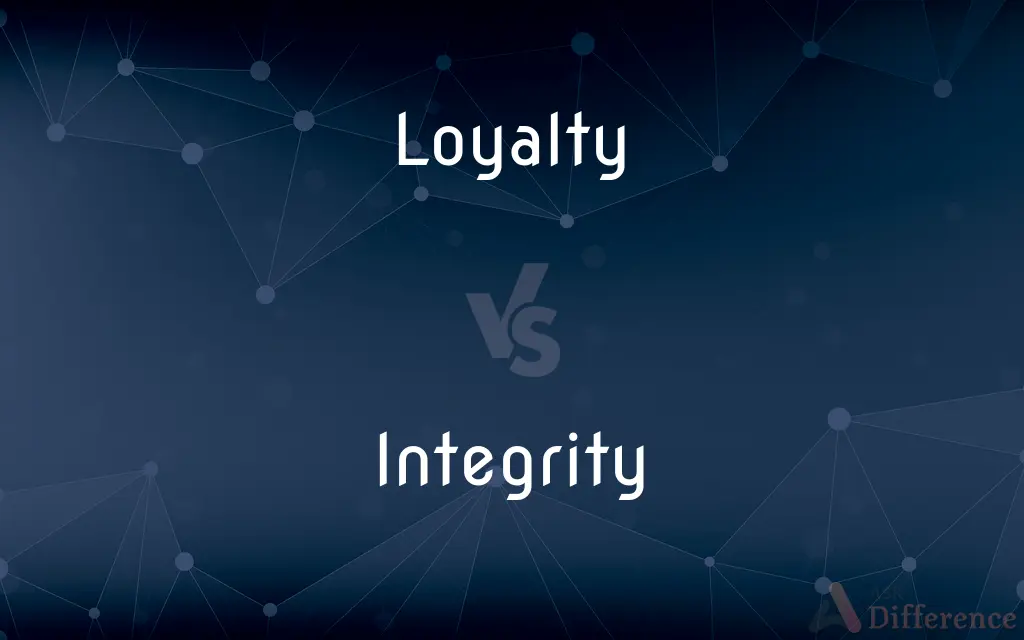Loyalty vs. Integrity — What's the Difference?
By Tayyaba Rehman — Updated on August 25, 2023
Loyalty is a devoted allegiance or attachment to someone or something, while integrity refers to the quality of being honest and having strong moral principles.

Difference Between Loyalty and Integrity
Table of Contents
ADVERTISEMENT
Key Differences
Loyalty and integrity, though sometimes intertwined, delineate two distinct aspects of one's character. Loyalty embodies the sense of dedication and faithfulness to a person, group, or cause. On the flip side, integrity reflects an individual's internal moral compass, ensuring they act in alignment with their values irrespective of external pressures.
Loyalty can manifest in various ways, such as supporting a friend during tough times or remaining committed to an employer. However, blind loyalty can sometimes conflict with integrity, especially if one remains loyal to a cause or person acting unethically. Integrity, meanwhile, would guide someone to act ethically, even if it means breaking loyalty.
In the realm of professional relationships, loyalty might mean sticking with an employer through challenges, while integrity would involve refusing to partake in dishonest business practices. While loyalty emphasizes the relationship's duration and depth, integrity prioritizes the moral quality of one's actions.
Loyalty often requires an external stimulus—a friend, organization, or cause—to which one can be loyal. Integrity, on the other hand, is an innate characteristic, not dependent on external entities, but instead on an individual's internal moral code.
It's worth noting that the most profound relationships and associations often combine loyalty with integrity. When one's loyalty to another is backed by shared values and ethical conduct, the bond is both deep and morally sound.
ADVERTISEMENT
Comparison Chart
Definition
Devoted allegiance to a person, group, or cause
Honesty and strong moral principles
Dependency
Often requires an external entity
Relies on an individual's internal moral compass
In Conflict
Might remain even in ethically challenging situations
Pushes for morally right actions regardless of allegiances
In Relationships
Highlights duration and depth
Emphasizes moral quality of actions
Potential Drawback
Blind loyalty can lead to supporting wrong actions
Over-rigid integrity might strain certain relationships
Compare with Definitions
Loyalty
Loyalty is unwavering support for someone or something.
His loyalty to the team never wavered, even during tough times.
Integrity
Integrity means adhering to a set of moral or ethical principles.
She acted with integrity, refusing to cheat on the exam.
Loyalty
Loyalty indicates strong attachment and commitment.
She displayed loyalty by staying with the company for over a decade.
Integrity
Integrity denotes being whole or undivided.
Despite challenges, he maintained his integrity and didn't compromise.
Loyalty
Loyalty is faithfulness to obligations or duties.
His loyalty to the cause inspired many to join.
Integrity
Integrity requires honesty and truthfulness.
She won the award because of her talent and integrity.
Loyalty
Loyalty can be demonstrated through consistent allegiance.
Their loyalty was evident as they stood by each other's side for years.
Integrity
Integrity involves doing the right thing even when not observed.
His decision to return the lost wallet showcased his integrity.
Loyalty
Loyalty, in general use, is a devotion and faithfulness to a nation, cause, philosophy, country, group, or person. Philosophers disagree on what can be an object of loyalty, as some argue that loyalty is strictly interpersonal and only another human being can be the object of loyalty.
Integrity
The state of being unimpaired; soundness
The building's integrity remained intact following the mild earthquake.
Loyalty
The quality of being loyal
His extreme loyalty to the Crown
Integrity
(cryptography) With regards to data encryption, ensuring that information is not altered by unauthorized persons in a way that is not detectable by authorized users.
Loyalty
The state of being loyal; fidelity.
Brand loyalty
Integrity
(aviation) The ability of systems to provide timely warnings to users when they should not be used for navigation.
Loyalty
Faithfulness or devotion to some person, cause or nation.
He showed loyalty to his local football club after successive relegations.
Integrity
Integrity implies consistency in actions, values, and principles.
People respected him for the integrity he displayed both in public and private.
Loyalty
The state or quality of being loyal; fidelity to a superior, or to duty, love, etc.
He had such loyalty to the king as the law required.
Not withstanding all the subtle baitWith which those Amazons his love still craved,To his one love his loyalty he saved.
Integrity
Integrity is the practice of being honest and showing a consistent and uncompromising adherence to strong moral and ethical principles and values. In ethics, integrity is regarded as the honesty and truthfulness or accuracy of one's actions.
Loyalty
The act of binding yourself (intellectually or emotionally) to a course of action;
His long commitment to public service
They felt no loyalty to a losing team
Integrity
Steadfast adherence to a strict moral or ethical code
A leader of great integrity.
Loyalty
The state or quality of being loyal.
Integrity
The quality or condition of being whole or undivided; completeness
Replaced a lost book to restore the integrity of his collection.
Loyalty
Often loyalties A feeling or attitude of devoted attachment and affection
My loyalties lie with my family.
Integrity
Steadfast adherence to a strict moral or ethical code.
Loyalty
The quality of being loyal
Integrity
The state of being wholesome; unimpaired
Loyalty
Feelings of allegiance
Integrity
The quality or condition of being complete; pure
Loyalty
Loyalty might mean prioritizing an entity's interests.
Out of loyalty, she always put her family's needs first.
Integrity
Trustworthiness; keeping your word.
Integrity
The state or quality of being entire or complete; wholeness; entireness; unbroken state; as, the integrity of an empire or territory.
Integrity
Moral soundness; honesty; freedom from corrupting influence or motive; - used especially with reference to the fulfillment of contracts, the discharge of agencies, trusts, and the like; uprightness; rectitude.
The moral grandeur of independent integrity is the sublimest thing in nature.
Their sober zeal, integrity, and worth.
Integrity
Unimpaired, unadulterated, or genuine state; entire correspondence with an original condition; purity.
Language continued long in its purity and integrity.
Integrity
Moral soundness
Integrity
An unreduced or unbroken completeness or totality
Common Curiosities
Can someone possess integrity but lack loyalty?
Yes, a person can act ethically (integrity) but might not show long-term allegiance (loyalty) to specific entities.
Can loyalty conflict with integrity?
Yes, if one remains loyal to a person or cause acting unethically, it may conflict with one's integrity.
What underpins integrity?
Integrity is based on moral and ethical principles.
How are loyalty and integrity related?
Both are essential values in relationships and character; however, loyalty focuses on allegiance, while integrity centers on ethical behavior.
How can loyalty be demonstrated?
Through unwavering support, commitment, and prioritizing the interests of the entity one is loyal to.
Is integrity an innate trait or can it be developed?
While some may naturally lean towards ethical behavior, integrity can be nurtured and developed over time.
Is loyalty always positive?
Not necessarily. Blind loyalty, without ethical consideration, can be detrimental.
Which is more critical in business, loyalty or integrity?
Both are valuable. However, in decision-making, integrity often takes precedence to ensure ethical operations.
Is there a universal standard for integrity?
While the concept of "right" and "wrong" can vary, integrity often follows widely accepted moral principles.
Can someone be too loyal?
Excessive or blind loyalty, without considering ethics, can be problematic.
Share Your Discovery

Previous Comparison
Angler vs. Fisher
Next Comparison
Reckon vs. ThinkAuthor Spotlight
Written by
Tayyaba RehmanTayyaba Rehman is a distinguished writer, currently serving as a primary contributor to askdifference.com. As a researcher in semantics and etymology, Tayyaba's passion for the complexity of languages and their distinctions has found a perfect home on the platform. Tayyaba delves into the intricacies of language, distinguishing between commonly confused words and phrases, thereby providing clarity for readers worldwide.
















































